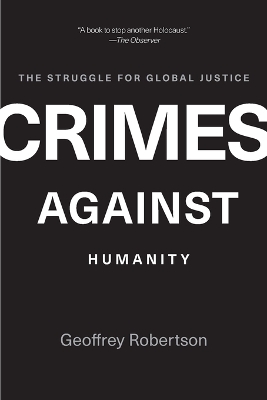Popular Penguins
1 total work
When it was first published in 1999, Crimes Against Humanity called for a radical shift from diplomacy to justice in international affairs. In vivid, non-legalese prose, leading human rights lawyer Geoffrey Robertson made a riveting case for holding political and military leaders accountable in international courts for genocide, torture, and mass murder.
Since then, fearsome figures such as Charles Taylor, Laurent Gbagbo, and Ratko Mladic have been tried in international criminal court, and a global movement has rallied around the human rights framework of justice. Any such legal framework requires constant evolution in order to stay relevant, and this newly revised and expanded volume brings the conversation up to date. In substantial new chapters, Robertson covers the protection of war correspondents, the problem of piracy, crimes against humanity in Syria, nuclear armament in Iran, and other challenges we are grappling with today. He criticizes the Obama administration's policies around "targeted killing" and the trials of Khalid Sheik Mohammed and other "high value" detainees. By rendering a complex debate accessible, Robertson once again provides an essential guide for anyone looking to understand human rights and how to work toward a more complete blueprint for justice.
Since then, fearsome figures such as Charles Taylor, Laurent Gbagbo, and Ratko Mladic have been tried in international criminal court, and a global movement has rallied around the human rights framework of justice. Any such legal framework requires constant evolution in order to stay relevant, and this newly revised and expanded volume brings the conversation up to date. In substantial new chapters, Robertson covers the protection of war correspondents, the problem of piracy, crimes against humanity in Syria, nuclear armament in Iran, and other challenges we are grappling with today. He criticizes the Obama administration's policies around "targeted killing" and the trials of Khalid Sheik Mohammed and other "high value" detainees. By rendering a complex debate accessible, Robertson once again provides an essential guide for anyone looking to understand human rights and how to work toward a more complete blueprint for justice.
